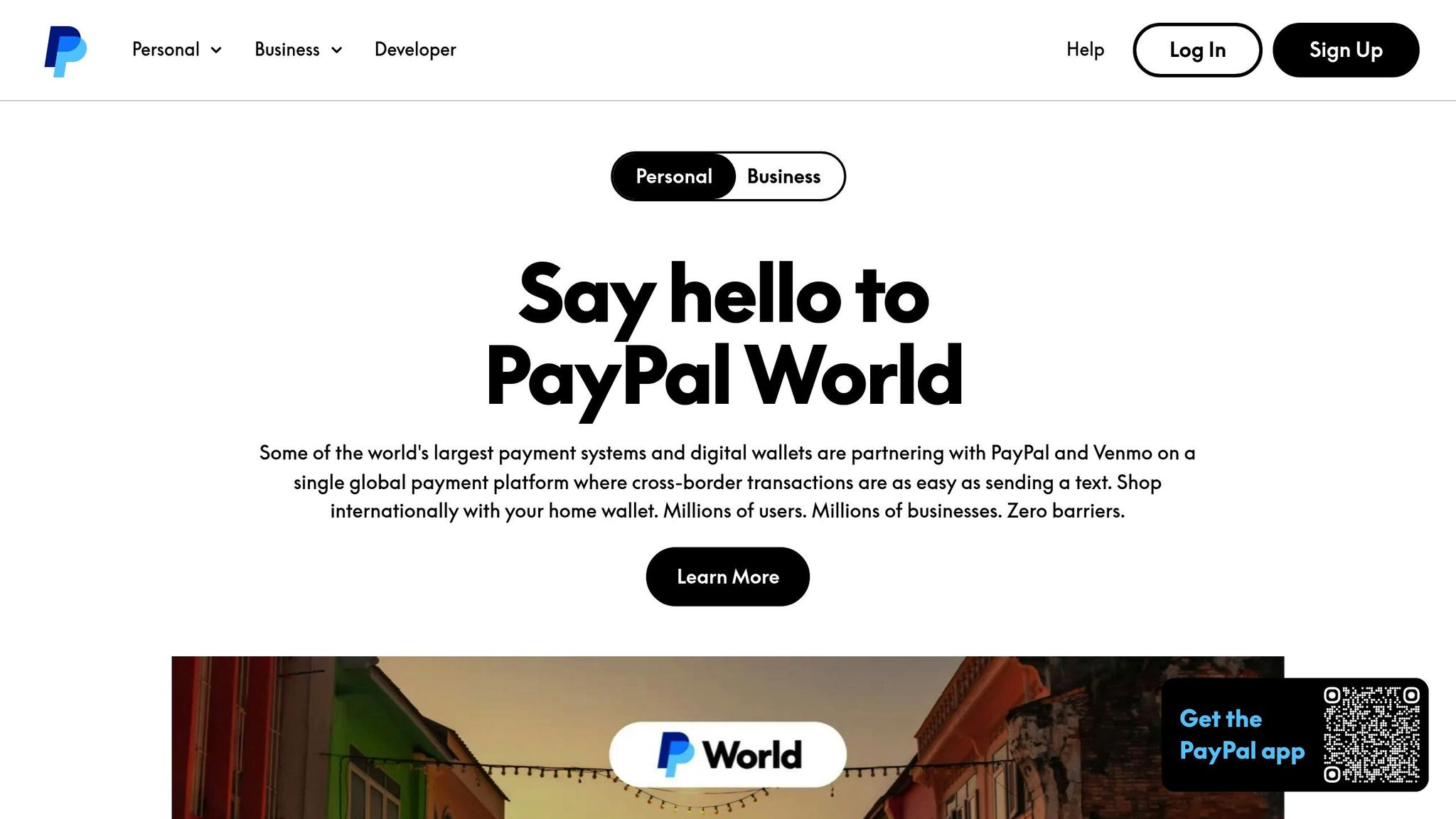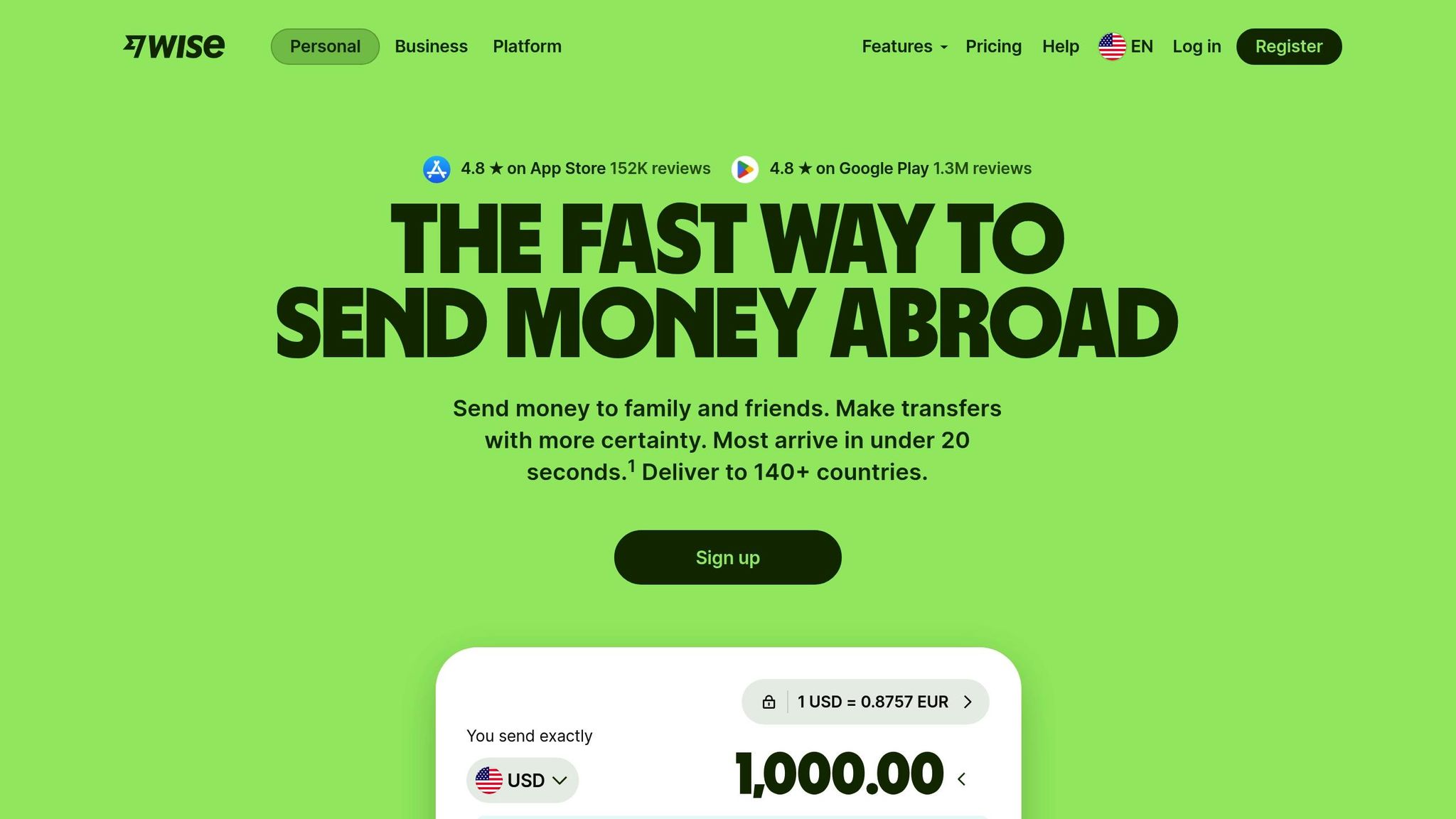Managing cross-border payments can be challenging for small businesses. High fees, poor exchange rates, and delays with traditional banks make finding efficient solutions crucial. This guide compares three popular platforms - PayPal, Wise, and Payoneer - based on their features, fees, and benefits to help you choose the best option for your needs.
Key Takeaways:
- PayPal: Widely accepted, supports 25 currencies, but has higher fees (up to 4.99% + $0.49 per transaction) and currency conversion markups (3-4%).
- Wise: Transparent fees starting at 0.33%, real exchange rates, supports 40+ currencies, and 95% of transfers complete within 24 hours.
- Payoneer: Supports 70+ currencies, free transfers between accounts, but has a more complex fee structure and a $29.95 annual fee if inactive.
Quick Comparison
| Platform | Fees (Intl. Transactions) | Currencies Supported | Key Features | Best For |
|---|---|---|---|---|
| PayPal | 4.99% + $0.49 + 3-4% FX | 25 | Easy setup, wide acceptance | Online retailers |
| Wise | From 0.33% + 0.33% FX | 40+ | Low fees, real exchange rates | Cost-conscious businesses |
| Payoneer | 1-3% + 0.5% FX | 70+ | Marketplace integration, security | Global marketplace sellers |
Choosing the right platform depends on your business needs: PayPal for convenience, Wise for cost efficiency, or Payoneer for global reach. Always review fees and features to ensure the platform aligns with your transaction volume and currency requirements.
How much do International (cross border) credit card processing fees cost?
1. PayPal

PayPal stands out as one of the most widely recognized digital payment platforms, operating in over 200 countries and regions. For small businesses stepping into international markets, PayPal provides a familiar and trusted option for customers worldwide.
Transaction Fees
Understanding PayPal's fee structure is crucial for managing expenses. For domestic USD transactions, PayPal charges 3.49% + $0.49 for standard digital payments and most commercial transactions. For international commercial transactions, an additional 1.50% cross-border fee applies, bringing the total to 4.99% + $0.49. If your business handles smaller transactions, PayPal's micropayment option charges 4.99% + $0.09 domestically, with the same 1.50% surcharge for international transactions. For example, on a $100 international sale, the fees would amount to approximately $5.48, excluding any currency conversion costs.
Currency Support
PayPal supports 25 currencies, including major ones like EUR, GBP, CAD, AUD, and JPY. When you receive payments in a foreign currency, PayPal automatically accepts them and creates a new currency balance in your account. This feature allows you to hold and manage balances in multiple currencies, add new currencies, or even change your primary currency - all directly from your wallet.
Currency Conversion
Currency conversion fees are another key factor to consider. PayPal applies a 3.0%–4.0% markup on the wholesale exchange rate for payment conversions and 3.0% for non-payment conversions. For instance, converting $1,000 could result in fees ranging from $30 to $40. However, maintaining balances in foreign currencies can help you avoid conversion fees and take advantage of favorable exchange rate movements.
2. Wise

Wise is a fintech platform that caters to 14.8 million users and handles an impressive $36 billion in transactions every quarter. It’s known for offering transparent pricing and real exchange rates, making international payments predictable and straightforward. Let’s dive into Wise’s fees, features, and standout advantages.
Transaction Fees
Wise keeps things simple with its fee structure. There are no monthly fees for business accounts, but a one-time setup fee is required. International transfer fees start at just 0.33%. Receiving fees depend on the currency: USD SWIFT payments cost $6.11, GBP payments are £2.16, and EUR payments are €2.39. Local payments in supported currencies? Those come with no fees at all. However, funding your account does incur a 2% charge.
If you’re interested in the Wise Multi-Currency Card, the first card is free, while additional cards cost £3 each, with an initial fee of $9. Currency conversion fees are also competitive, starting at 0.33% based on the mid-market rate.
Currency Support
Wise supports over 40 currencies and allows users to receive money with local account details in 22 of them. It covers key business currencies like USD, EUR, GBP, CAD, AUD, HKD, and SGD. For small businesses, this flexibility means you can hold balances across multiple currencies, helping you sidestep unnecessary conversion fees.
Transfer Speed
Speed is a major draw for Wise, especially for small businesses. Between January and March 2025, 64% of transfers were completed in under 20 seconds, and 95% were finished within 24 hours. That said, some transfers may take up to two business days, depending on the currency pair.
"With a Wise account, you can make transfers worldwide - in just a few clicks. And you'll benefit from low fees* and mid-market exchange rates, along with a fully trackable service."
- Wise
This kind of speed is essential for managing global payroll or supplier payments, where delays can disrupt cash flow and strain business relationships.
Security and Compliance
While Wise isn’t a traditional bank, it is regulated by financial authorities in every region where it operates. The platform has built strong user trust, boasting a 4.3/5 rating on Trustpilot from over 255,000 reviews and a 4.8/5 rating on the Apple App Store based on 6,700 reviews. Although it doesn’t offer services like cash deposits, check processing, or lending, Wise focuses solely on international money transfers, ensuring compliance and reliability in all its operations.
sbb-itb-165eed9
3. Payoneer

Payoneer stands out as a reliable option for small businesses expanding into global markets. With a presence in over 190 countries and territories and support for 70 currencies, the platform connects 2 million active users worldwide, offering businesses a broad international reach. Additionally, Payoneer helps reduce marketplace fraud by more than 70%.
Transaction Fees
Payoneer’s fee structure depends on how you use the platform. Receiving payments from other Payoneer users is free, and there’s no monthly maintenance fee. However, if you don’t receive at least $2,000 in payments annually, a $29.95 account fee applies.
Here’s a breakdown of receiving payment fees:
- Credit card payments: Up to 3.99% plus $0.49 in certain countries.
- ACH bank debits (US only): 1% per transaction.
- PayPal payments (US only): 3.99% plus $0.49.
- Payments in local currency: Free, while receiving funds in other currencies incurs either a fixed fee or a 1% fee, depending on the amount.
Sending money also comes with variable costs:
- International transfers: Up to 1% (minimum $4.00).
- Same-country transfers (USD, EUR, GBP): Flat fee of up to $4.00.
- Bank transfers to non-Payoneer users: Up to 3%.
For withdrawals, local currency transfers are reasonably priced. For instance, USD, EUR, and GBP withdrawals cost $1.50 for amounts up to $50,000 monthly, while higher volumes are charged at 0.5%. Non-local currency withdrawals can cost up to 3%.
Currency Support
Payoneer supports a wide range of currencies, making it easier for businesses to operate globally. Local receiving accounts are available in major currencies like USD, EUR, GBP, CAD, AUD, JPY, and CNH, while conversion to currencies like CZK, PLN, RUB, and VND is possible for tax payments. Currency conversion is straightforward, with a transparent 0.5% fee based on real-time exchange rates.
For businesses in countries like Japan, India, South Korea, Thailand, the UK, and the USA, receiving USD payments is completely free. Additionally, Payoneer allows transfers between currency balances, helping businesses save on international wire transfer fees.
Integration Options
Payoneer offers seamless integration with various marketplaces and payment options, enhancing its flexibility. Businesses can accept payments through bank transfers, credit cards, and ACH transfers, which plays a significant role in delivering a better customer experience.
"With Payoneer we can offer multiple payment options like bank transfer, Credit Card, ACH transfer. This is key to our customer success and for driving a superior customer experience for our global clients." - Chintan Thakkar and Rajat Lala, SoluLab
One example of Payoneer’s impact is its collaboration with Linio in 2012. This partnership helped Linio grow into the most visited e-commerce platform in Latin America, covering countries like Colombia, Mexico, Peru, and Chile.
Security and Compliance
Security is a cornerstone of Payoneer’s operations. The platform is globally regulated and registered with financial authorities in regions including the USA, UK, EU, Hong Kong, Japan, Canada, Australia, Gibraltar, and India. It also holds PCI DSS level 1 certification and has completed SOC 2 Type II and SOC 1 Type II assessments by independent auditors.
"We recognize the sensitivity of your business, which is why Payoneer prioritizes top-tier security." - Payoneer
Payoneer employs multiple security measures, such as 2-step verification, CAPTCHA challenges, and RSA adaptive authentication, to prevent unauthorized access. Transactions are monitored in real time to detect fraud, identity theft, and phishing attempts. Additionally, the platform’s anti-money laundering (AML) program undergoes quarterly testing and annual audits. Payoneer also verifies all applicants during registration and conducts further reviews when sellers reach specific earnings thresholds, contributing to lower-than-average Account Take Over (ATO) rates.
Advantages and Disadvantages
Let’s dive deeper into the standout features and potential drawbacks of each platform, building on the earlier review.
PayPal is widely recognized for its ease of use and broad acceptance. It integrates smoothly with eCommerce platforms and offers strong security features like fraud protection and two-factor authentication, making it a favorite for online retailers. However, its higher transaction fees and limitations in customer support can be frustrating for some users.
Wise stands out for its clear pricing and competitive exchange rates. By using mid-market rates with no markups and offering low fees without monthly charges, it appeals to businesses focused on cost efficiency. Its strong security measures, including high-level encryption and regulatory compliance, further boost its reliability. Plus, integrations with accounting software simplify financial management. Notably, Wise doesn’t present any major drawbacks.
Payoneer offers a secure platform with advanced fraud monitoring and integrates effectively with online marketplaces. However, its fee structure can be somewhat complex, which might require extra attention when managing costs.
Here’s a quick summary of the platforms' strengths, weaknesses, and ideal use cases:
| Platform | Key Strengths | Main Weaknesses | Best For |
|---|---|---|---|
| PayPal | Broad acceptance, eCommerce integration, strong fraud protection | Higher fees, limited support | Online retailers needing quick setup |
| Wise | Transparent pricing, mid-market exchange rates, accounting integrations | – | Cost-conscious businesses prioritizing transparency |
| Payoneer | Secure authentication, robust fraud monitoring, marketplace integration | Complex fee structure | Sellers in global marketplaces |
Interestingly, nearly half of businesses report that payment processing costs are a significant challenge. This makes Wise’s straightforward pricing especially appealing for budget-conscious operations. On the other hand, 30% of businesses struggle with cross-border transaction efficiency, where PayPal’s wide acceptance and Payoneer’s strong global network can offset their higher fees.
"Choosing the right solution for cross-border payments is a crucial decision for any company." - Bryce Crawford
To find the best fit, it’s essential to align fee structures with your transaction needs. Free accounts and demos can be a great way to test whether a platform meets your specific operational requirements before committing.
Conclusion
When it comes to choosing the right service for your small business, understanding your specific needs is key. Traditional banking often falls short for international payments, making smarter, more flexible solutions a necessity.
Your decision should factor in transaction volume, currency requirements, and cost considerations:
-
PayPal: Known for its speed and convenience, PayPal supports 25 currencies and charges a 2.99% fee for goods and services. Its ability to process payments instantly makes it especially attractive for online retailers.
"With our complete payments solution, small businesses can get access to all of these tools with one integration."
– Nitin Prabhu, VP, Merchant Experiences and Payment Solutions, PayPal - Wise: Offers transparent fees and real exchange rates, making it a cost-effective choice for straightforward international money transfers.
- Payoneer: Supports over 80 currencies, provides free transfers between accounts, and charges a $29.95 annual fee after 12 months of inactivity. It's particularly useful for businesses with diverse international revenue streams.
Each platform brings unique benefits to the table, so the best choice depends on your operational priorities. For example, businesses handling high transaction volumes may value PayPal's speed and integration capabilities. Those prioritizing low-cost, transparent transfers might lean toward Wise, while companies managing varied international payments could benefit from Payoneer's broad currency support.
Consider this: small businesses that accept four or more payment methods generate seven times more annual revenue than those with fewer options. And with digital payments projected to reach $20.37 trillion in transactions by 2025, adapting to these solutions isn't just smart - it's essential for growth.
FAQs
What are the differences in transaction fees among PayPal, Wise, and Payoneer, and which one is the most budget-friendly for small businesses?
PayPal charges around 2.99% for goods and services, along with extra fixed fees depending on the type of transaction. Payoneer’s fees can reach 3.99% for certain transactions, which may also include additional charges for currency conversion and withdrawals. Wise, however, is often a more budget-friendly option for small businesses, with fees typically ranging from 0.5% to 0.9% for international transfers and a clear, upfront pricing structure.
For small businesses managing frequent cross-border payments, Wise stands out thanks to its competitive rates and straightforward approach to fees. It's a practical choice for keeping costs low while ensuring efficient international transactions.
What should small businesses consider when choosing between PayPal, Wise, and Payoneer for cross-border payments?
When deciding between PayPal, Wise, and Payoneer for cross-border payments, small businesses should weigh a few critical factors:
- Fees and Costs: PayPal is widely accepted but tends to charge higher fees for international transactions. Wise, on the other hand, offers lower, transparent fees and uses real exchange rates, which can help cut costs. Payoneer is a strong contender for competitive pricing, particularly for local bank transfers.
- Currency Exchange: Wise takes the lead here, offering the exact mid-market exchange rate with no hidden markups. In contrast, PayPal and Payoneer may apply additional markups on currency conversions.
- Transaction Needs: PayPal works well for businesses that need broad acceptance and buyer protection. Wise is a smart choice for those prioritizing cost-effective transfers, while Payoneer shines in supporting businesses that frequently deal with international vendors or clients.
Take a close look at your business's transaction volume, target countries, and preferred payment methods to decide which platform aligns best with your needs.
How do Wise and Payoneer help small businesses with currency support and fast international transfers?
Wise makes it simple for small businesses to manage over 40 currencies, offering mid-market exchange rates that help cut costs on international transactions. Transfers are typically fast, with payments often arriving within 1–2 business days, depending on the destination and currency. These features make cross-border payments more manageable and efficient for small businesses.
Payoneer, on the other hand, supports multiple currencies and provides tools like global receiving accounts, allowing businesses to accept payments from clients worldwide. With fast transfer options and competitive fees, it helps small businesses handle international operations smoothly while keeping cash flow steady.


